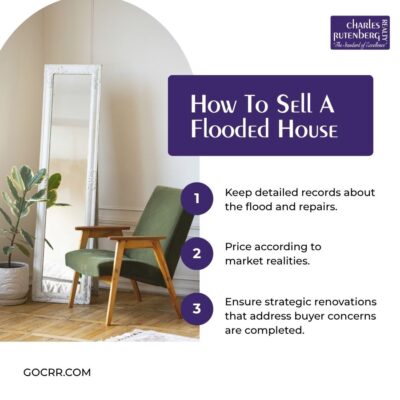
We can all agree—flooding is one of the biggest headaches a realtor can face when trying to sell a property. Water possesses this uncanny ability to find every crack, crevice, and soft spot in a home, leading to levels of destruction that can go from a minor inconvenience to complete devastation. Having worked with tons of clients navigating post-flood sales, I’ve seen how quickly a once-marketable listing can become a source of stress, delays, and tough conversations.
The particularly frustrating thing about floods is they’re entirely unpredictable. Yes, coastal areas and communities along rivers may expect more periodic water problems. But then, flooding can occur anywhere! Just ask the agents working in previously “low-risk” regions who found themselves dealing with homes hit by record-setting weather events in recent years.
The process of selling a home becomes much more complicated if the property has suffered from flood damage compared to a standard home sale. What could have been a routine transaction now requires a strategic approach to address the buyer concerns, among other things. It may be challenging but not impossible!
That’s why, today, I’m sharing this practical and effective guide on how to sell a house that has flooded.
How to Sell A House That Has Flooded
There are unique challenges that come with selling a flooded house that standard home sales don’t face. When you hear “flood damage,” many prospective buyers picture rotten drywall, buckled floors, and the dreaded “m” word (yes, mold growth). Their minds dart to estimating repairs and fretting about future flooding risks.
But here’s the catch. With the right approach, you can transform what seems like a major obstacle into a manageable hurdle. At Charles Rutenberg Realty, I’ve witnessed a number of previously flooded properties make successful sales, and the common denominator is always a thoughtful strategy that addresses buyer fears head-on.
Shortly, I’ll be sharing those thoughtful, strategic steps that will help you overcome this hurdle, and get you a great deal on your listing.
Do You Have To Declare Flooding When Selling A House?
Yes, and transparency will serve you well in the long run.
For starters, you’re required to disclose this information to potential buyers. Water damage, flood history, and other related repairs are specifically mentioned in the Seller’s Property Information Form (or its equivalent) used in most states. This is not merely a formality. It is, in fact, a legal requirement intended to protect both the buyer and the seller—and anyone in between!
The consequences of non-disclosure of past flooding can be staggering and prolonged. I’ve watched as sellers were sued years after closing deals because the new owners found undisclosed water damage. These legal battles usually leave sellers paying far more than they “saved” by hiding information, not to mention the stress and reputation damage for the realtor who made the sale.
Beyond legal obligations, transparency helps build trust with prospective buyers. When you work with a real estate agent capable of effectively marketing homes with damage, your honesty transforms into an asset as opposed to a setback. Buyers appreciate knowing exactly what they’re getting into, and many would prefer to buy a house with disclosed and repaired flood damage than one with a suspiciously pristine background.
At Charles Rutenberg Realty, we’ve found that full disclosure coupled with thorough documentation of repairs builds a trust that accelerates—rather than stalls—the sale. When buyers are confident that you’ve been transparent about past problems with a property, they are more likely to proceed with confidence than to have lingering doubts that can sink a deal at the final hour.
How To Sell A Flooded House
Follow these proven strategies that can help tip the scales in your favor:
Keep detailed records about the flood and repairs.
The best way to encourage potential buyers to trust the sale is in documentation. Detailed documentation serves as both reassurance and protection for all parties involved. So, begin by gathering information about when the flooding happened, the extent of the damage, and what was affected. Attach professional assessment reports whenever possible.
The real value comes in documenting every repair made to replace damaged elements of the property due to the flooding. Better still, create a comprehensive file that includes:
- Before and after pictures of all repairs
- Detailed invoices from licensed contractors
- Permits pulled for major repair work
- Mold inspection certification documents
- Engineering reports (if structural elements were affected)
- Updated flood insurance coverage proof
Most sellers err in thinking that less information is better, but I can assure you that the reverse is the case! Buyers are in fact more comfortable when they can see the full history of problems and solutions. This transparency can help them see how serious you were about the flooding and how you took appropriate measures instead of trying to cut corners to make a quick sale.
Price according to market realities.
As a realtor, balancing a few factors will help determine the proper asking price for a previously flooded home. While this may require you to adjust your expectations slightly, the right pricing strategies will protect your seller’s equity and reflect current market dynamics.
To determine the proper price, it’s essential to conduct a comparative market analysis factoring in:
- Similar properties that have experienced flooding
- The quality and completeness of the repairs
- Current market conditions in the area
- Time elapsed since the flooding event
- Improvements made that go beyond restoration
At Charles Rutenberg Realty, we recommend pricing that reflects the quality of repairs, not simply applying a one-size-fits-all “damaged discount”. If you’ve worked with a seller who’s made thoughtful improvements or invested in high-quality materials during the restoration process, these can actually offset some of the stigma associated with previous flooding.
Ensure strategic renovations that address buyer concerns are completed.
Sometimes, it’s not enough that the seller has fixed the flood damage. You may need to go a step further to attract buyers who might otherwise be hesitant. By advising your sellers to perform strategic renovations that specifically address typical buyer concerns about flood-damaged homes, you can significantly increase the likelihood of a successful sale.
Here are some big-impact improvements to consider:
- Install water detection systems or sump pumps to prevent future issues
- Upgrade to waterproof or water-resistant flooring in previously affected areas
- Improve drainage systems around the property’s exterior
- Add flood vents if appropriate for the property type
- Document improved insulation that replaced water-damaged materials
- Implement mold-resistant building materials in renovations
These targeted adjustments show that the damage has not only been fixed but also proactively addressed. These upgrades serve as valuable selling points to highlight when marketing the home, shifting focus away from the flooding itself.
As a realtor, you can further enhance the appeal by suggesting the seller create “worry-free zones” in the areas hit the hardest by flooding. For example, if a basement flooded, suggest transforming it into a waterproof space with proper drainage, moisture barriers, and water-resistant finishes to convert a liability into a selling feature.
Selling a house that has experienced flooding certainly comes with unique challenges, but it’s far from impossible.
As a realtor, successfully selling a property that’s experienced flooding requires a mix of strategic pricing, targeted renovations, and transparent communication with buyers. While it may take extra effort to address buyer concerns and market the home effectively, the right approach can turn a property with flood damage into a competitive listing.
If you live in the state of Florida and are ready to expand your real estate expertise and work with a supportive team that understands how to navigate these unique challenges, join us today. Our team of experienced professionals is here to guide you through every aspect of selling homes and help you thrive in this competitive market. For more information, feel free to contact us—we’d love to connect and help you take the next step in your real estate career.





